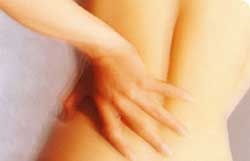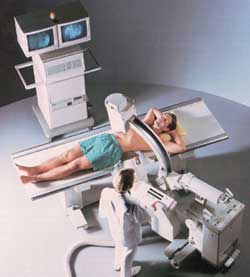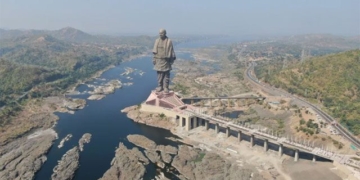Kidney Inflammation
 |
Kidney Pain (Image: bbc.co.uk) |
Kidney inflammation, known as Pyelonephritis, is caused by an infection in the left kidney. In this condition, bacteria ascend from the lower urinary tract and invade the kidney. Patients typically experience sharp pain in the flank area, high fever, and may also exhibit bladder symptoms such as frequent urination and painful urination, along with extreme fatigue.
A urine test usually reveals the presence of bacteria. Patients often require hospitalization for intravenous fluids and antibiotics. After treatment, it is crucial to monitor kidney function through an Intravenous Pyelogram (IVP) to ensure the kidney returns to normal and does not have any stones.
Kidney Stones
Kidney stones form from insoluble mineral salts in the urine, such as calcium, oxalate, or phosphate.
Most kidney stones are radio-opaque, meaning they can be seen on a regular X-ray (unlike gallstones, which are typically not visible on regular X-rays). This condition is more common in patients with a genetic predisposition, such as those whose parents or siblings have had kidney stones. It is also prevalent in patients with parathyroid gland disorders (which regulate calcium in the blood, located near the thyroid gland), thyroid disorders, bone diseases like Paget’s disease, small intestine diseases, and sarcoidosis, as well as renal tubular acidosis.
Some patients develop stones due to bacteria that produce urease, which breaks down urea in the urine into magnesium-ammonium-calcium, leading to stone formation. These stones can be quite large, potentially filling the entire kidney (staghorn calculus).
A small number of patients may have urate stones, which are not radio-opaque. These stones are often found in patients with gout or due to hereditary factors. While insufficient water intake is not the direct cause of kidney stones, individuals with a history of kidney stones should drink plenty of water to prevent recurrence.
How to Identify Kidney Stones:
Kidney stones, especially smaller ones that pass into the ureter from the kidney to the bladder, can cause severe, intermittent abdominal pain. Patients may experience sudden, intense pain accompanied by vomiting (many patients describe this pain as worse than labor!). Symptoms of urinary tract infection, such as fever, painful urination, frequent urination, and flank pain radiating to the pelvic or genital area, may also occur.
Some patients may be asymptomatic and unaware they have kidney stones, only discovering them incidentally through imaging for other conditions, such as a pelvic ultrasound.
Urine from individuals with kidney stones often contains blood or bacteria. An IVP is the most reliable test to detect stones, especially non-radio-opaque or small stones, and it also helps assess kidney function.
 |
ESWL Ultrasound for Kidney Stone Fragmentation |
CT scans may also be used to detect kidney stones in some cases.
Treatment for Kidney Stones:
When patients experience severe abdominal pain due to stones, they are often hospitalized for pain relief and intravenous fluids if vomiting is severe. Diuretics should be avoided in this case, as they can worsen urinary obstruction. About 80% of small stones will pass naturally. Stones measuring 4mm or smaller typically pass without intervention, whereas stones larger than 6mm may require surgical methods, especially if there is an infection or blockage in the urinary tract.
Urate stones can be dissolved chemically (chemolysis). Urine is maintained at a pH of 7. Allopurinol is prescribed after the formation of urate stones to prevent recurrence.
Larger stones are usually broken down using ultrasound (ESWL: extracorporeal shock wave lithotripsy) before diuretics are administered to help expel them. Surgical methods to remove stones are becoming less common. Another method involves using a basket to retrieve stones that are located in more accessible areas. Specialists may use cystoscopy to remove stones. If a stone is obstructing the ureter and causing kidney blockage, a stent may be inserted into the ureter to bypass the obstruction.
In summary, if kidney stones impair kidney function by obstructing the urinary tract or causing significant pain, they need to be removed. Small stones in non-harmful positions can simply be monitored. Drinking plenty of water is essential to prevent dehydration, which can lead to urinary tract infections.
Dr. Tran Thi Xuyen




















































